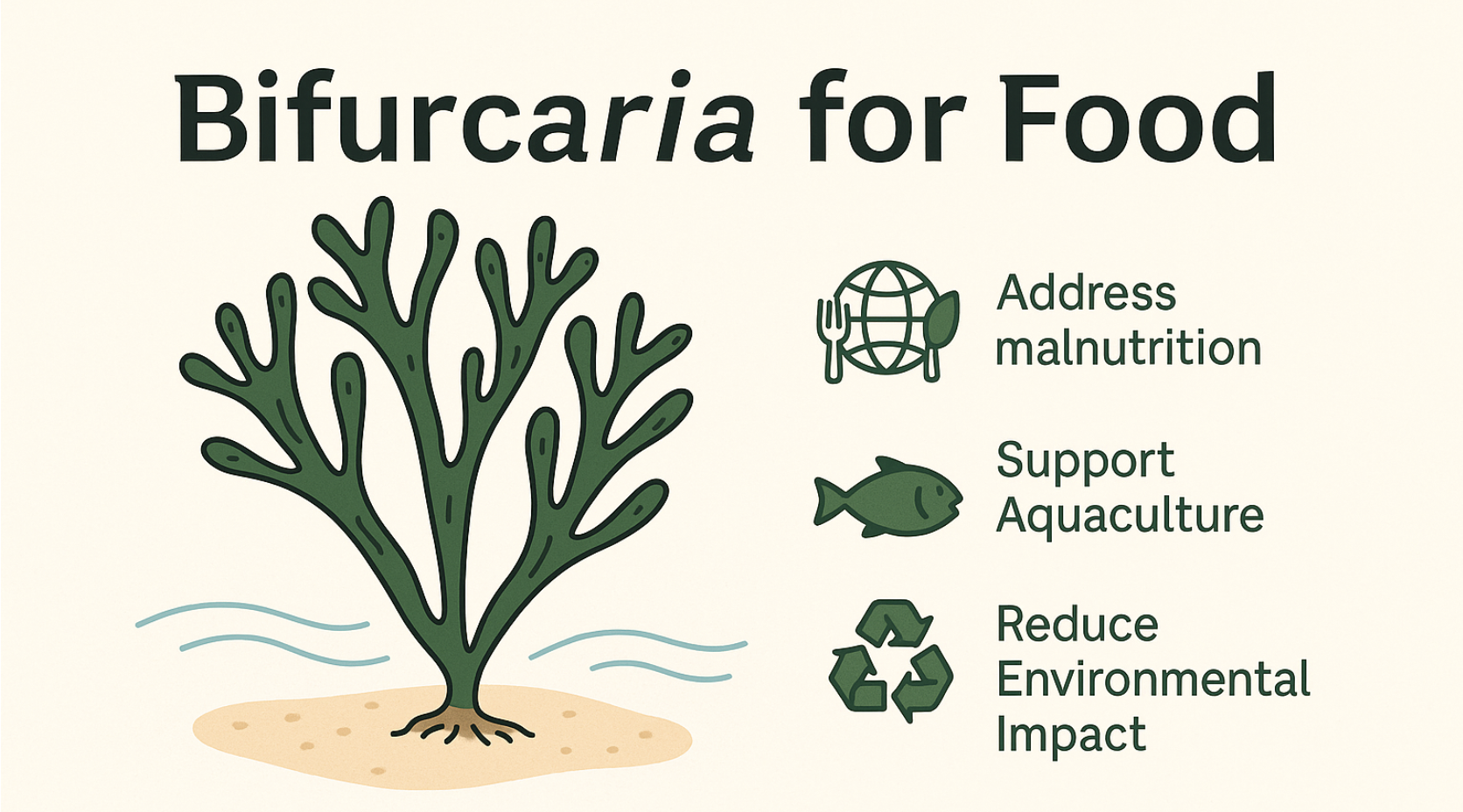Bifurcaria for Food

- Summary
- Fact Sheet
- Project Details
This project prototype explores the use of Bifurcaria bifurcata, a brown macroalga, as a multifunctional solution to food insecurity and environmental sustainability. Developed within the Master’s in Biotechnology of Marine Resources at the Polytechnic University of Leiria, the initiative aims to harness the species’ rich nutritional and bioactive properties for application in food products, aquaculture, and organic agriculture.
The concept proposes a seaweed biorefinery model that extracts maximum value from the biomass—using it both as a dietary supplement and a bioresource for sustainable farming. Bifurcaria bifurcata offers a low-impact alternative to land-based crops, does not require freshwater, and supports bioremediation efforts in marine environments.
Targeting vulnerable populations and the agricultural sector, the project aligns with SDGs 2 (Zero Hunger), 3 (Good Health and Well-being), 12 (Responsible Consumption and Production), and 14 (Life Below Water). It is scalable and transferable to other coastal regions, supporting global food system resilience and a growing marine bioeconomy.
Challenge
The project addresses the critical issue of food insecurity, which affects millions of people worldwide. By leveraging the potential of marine macroalgae, specifically Bifurcaria bifurcata, the project aims to provide a sustainable and nutritious food source. Additionally, it tackles environmental sustainability by promoting the use of algae in bioremediation and as a natural fertilizer, thus contributing to a circular economy.
Target Groups:
The primary beneficiaries of this project are vulnerable communities, including children, pregnant women, the elderly, and developing communities. The project also benefits the agricultural and aquaculture sectors by providing a sustainable source of nutrients and promoting environmentally friendly practices. Ultimately, the global community stands to gain from improved food security and reduced environmental impact.
Solution
The solution involves utilizing Bifurcaria bifurcata, a brown macroalga, as a multifunctional resource. This species is rich in essential nutrients and bioactive compounds, making it suitable for use in the food industry as a supplement to address nutritional deficiencies. Additionally, the biomass can be used in aquaculture to bioaccumulate nutrients and as an organic fertilizer in agriculture. The project proposes developing a biorefinery for seaweed to maximize its potential and align with Sustainable Development Goals (SDGs) 2 (Zero Hunger), 3 (Good Health and Well-being), 12 (Responsible Consumption and Production), and 14 (Life Below Water).
Innovation
The unique selling point of this project is the use of Bifurcaria bifurcata, which does not compete with traditional crops for land or freshwater resources. This macroalga can thrive in various climatic conditions and offers a wide range of applications due to its high bioactive potential. Its use in bioremediation and as a natural fertilizer further enhances its value, making it a versatile and sustainable solution to food insecurity and environmental challenges.
Impact
The impact of this project is significant on multiple fronts. Environmentally, it promotes sustainable practices by reducing waste and utilizing natural resources efficiently. Economically, it supports the development of the bioeconomy and creates opportunities in the agricultural and aquaculture sectors. Socially, it addresses food insecurity and improves the nutritional status of vulnerable populations. By aligning with several SDGs, the project contributes to global efforts to achieve a more sustainable and equitable future.
Feasibility and Transferability
The feasibility of this project is supported by recent technological advances and the regulatory framework in Portugal, which allows for the sustainable harvesting of wild algae. While the slower growth rate of Bifurcaria bifurcata presents a challenge, its high bioactive potential and adaptability make it a viable candidate for large-scale cultivation. The project’s success depends on investments in research, qualified human resources, and cooperation between various sectors.
The transferability of this project is high, as the technology and processes can be adapted to different regions with access to similar macroalgae species. By sharing knowledge and best practices, other countries can replicate the model, contributing to global efforts to enhance food security and environmental sustainability.
This student project is submitted through:
School of Tourism and Maritime Technology, Polytechnic University of Leiria
It involved 2 students in the Master in Biotechnology of Marine Resources
Project presentation video: Watch Here
